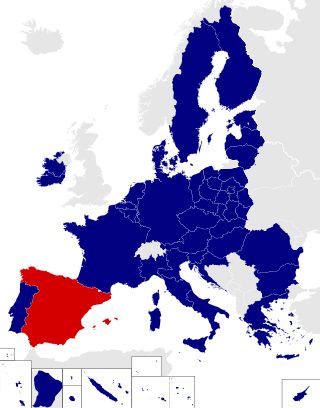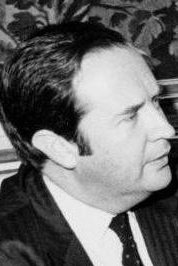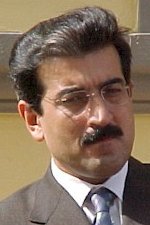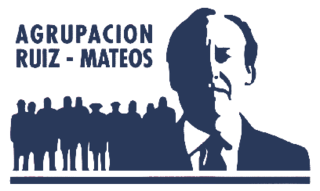
The Spanish Socialist Workers' Party is a social-democratic political party in Spain. The PSOE has been in government longer than any other political party in modern democratic Spain: from 1982 to 1996 under Felipe González, from 2004 to 2011 under José Luis Rodríguez Zapatero, and since 2018 under Pedro Sánchez.
The Republican Left of Catalonia is a pro-Catalan independence, social-democratic political party in the Spanish autonomous community of Catalonia, with a presence also in Valencia, the Balearic Islands and the French department of Pyrénées-Orientales. It is also the main sponsor of the independence movement from France and Spain in the territories known as Catalan Countries, focusing in recent years on the creation of a Catalan Republic in Catalonia proper. Its current president is Oriol Junqueras and its secretary-general is Marta Rovira. The party is a member of the European Free Alliance.

Elections in Spain encompass four different types: general elections, regional elections, local elections, and elections to the European Parliament. General elections and regional elections are typically conducted at the conclusion of the national or regional legislative mandate, which usually spans four years since the previous election. However, early elections can be called in certain circumstances. On the other hand, local council elections and elections to the European Parliament follow fixed dates, although some local government bodies, such as provincial councils, are not directly elected. In most elections, a party-list proportional representation (PR) system is employed, while the Senate utilizes the plurality system.

Francisco José Millán Mon is a Spanish politician and Member of the European Parliament with the People's Party, part of the European People's Party. Mon was born in Pontevedra. He sits on the European Parliament's Committee on Foreign Affairs, and is a substitute for the Committee on Development and a member of the Delegation to the Euro-Mediterranean Parliamentary Assembly.

Democratic and Social Centre is a liberal political party in Spain, founded in 1982 by former Prime Minister Adolfo Suárez. The party was a member of the Liberal Democratic and Reformist Group in the European Parliament and the Liberal International. In 2006, most of its remaining members merged into the People's Party, though a reduced faction continued the party, which won some seats in the 2007 local elections.

The 1989 European Parliament election in Portugal was the election of MEP representing Portugal constituency for the 1989-1994 term of the European Parliament. It was part of the wider 1989 European election. In Portugal the election was held on 18 June.
The 1987 European Parliament election in Portugal took place on 19 July 1987. It was the election of all 24 MEPs representing the Portugal constituency for the remainder of the 1984–1989 term of the European Parliament. Portugal had acceded to the European Community on 1 January 1986 and had been represented in the European Parliament by 24 appointed delegates until elections could be held. These elections took place on the same day of the legislative elections of 1987.

Between 1973 and 1993 the European Communities saw the first enlargement of the Communities. On 1 January 1973, Denmark, Ireland, and the United Kingdom became the first countries to join the Communities. The détente allowed initiation of the reunification of the continent through establishing the Conference on Security and Co-operation in Europe. Greece was the next to join EC on 1 January 1981, followed by Spain and Portugal joining on 1 January 1988, while Turkey has initiated the procedure in 1987. Upon the fall of the Iron Curtain, the CSCE was transformed in 1990 into Organization for Security and Co-operation in Europe, the Communities enlarged for a fourth time through the German reunification, while other former communist European countries stated their firm commitment to join, prompting formulation of the Copenhagen criteria. This period was, however, also the one which witnessed the first voluntary exit from the Communities, namely the one of Greenland in 1985. The integration progressed under the Delors Commission resulting in the creation of the European Union in 1993.

Spain is a European Parliament constituency for elections in the European Union covering the member state of Spain. It is currently represented by 59 Members of the European Parliament and is the second largest European Parliament constituency in terms of geographic area after France, as well as the third most populated after Germany and France.

The 1987 European Parliament election in Spain was held on Wednesday, 10 June 1987, to elect the MEP delegation from the country for the 2nd European Parliament. All 60 seats allocated to Spain as per the 1985 Treaty of Accession were up for election. The election was held simultaneously with regional elections in thirteen autonomous communities and local elections all throughout Spain.

The 1989 European Parliament election in Spain was held on Thursday, 15 June 1989, as part of the EU-wide election to elect the 3rd European Parliament. All 60 seats allocated to Spain as per the 1985 Treaty of Accession were up for election.

The 1999 Cantabrian regional election was held on Sunday, 13 June 1999, to elect the 5th Parliament of the autonomous community of Cantabria. All 39 seats in the Parliament were up for election. The election was held simultaneously with regional elections in 12 other autonomous communities and local elections all throughout Spain, as well as the 1999 European Parliament election.

The 1987 Canarian regional election was held on Wednesday, 10 June 1987, to elect the 2nd Parliament of the Autonomous Community of the Canary Islands. All 60 seats in the Parliament were up for election. The election was held simultaneously with regional elections in twelve other autonomous communities and local elections all throughout Spain, as well as the 1987 European Parliament election.

The 1999 Canarian regional election was held on Sunday, 13 June 1999, to elect the 5th Parliament of the Autonomous Community of the Canary Islands. All 60 seats in the Parliament were up for election. The election was held simultaneously with regional elections in twelve other autonomous communities and local elections all throughout Spain, as well as the 1999 European Parliament election.

The 1987 Spanish regional elections were held on Wednesday, 10 June 1987, to elect the regional parliaments of thirteen of the seventeen autonomous communities—Aragon, Asturias, the Balearic Islands, the Canary Islands, Cantabria, Castile and León, Castilla–La Mancha, Extremadura, La Rioja, Madrid, Murcia, Navarre and the Valencian Community—, not including Andalusia, the Basque Country, Catalonia and Galicia, which had separate electoral cycles. 779 of 1,169 seats in the regional parliaments were up for election. The elections were held simultaneously with local elections all throughout Spain, as well as the 1987 European Parliament election.

The Party of Labor and Employment–Ruiz-Mateos Group, better known as Ruiz-Mateos Group, was a Spanish political party founded by businessman José María Ruiz-Mateos following the collapse and expropriation of his Rumasa holding company. It was enrolled in the register of political parties with the Spanish Ministry of the Interior on August 30, 1989.

The 1987 Balearic regional election was held on Wednesday, 10 June 1987, to elect the 2nd Parliament of the autonomous community of the Balearic Islands. All 59 seats in the Parliament were up for election. The election was held simultaneously with regional elections in twelve other autonomous communities and local elections all throughout Spain, as well as the 1987 European Parliament election.

This is the results breakdown of the European Parliament election held in Spain on 10 June 1987. The following tables show detailed results in each of the country's 17 autonomous communities and in the autonomous cities of Ceuta and Melilla.














